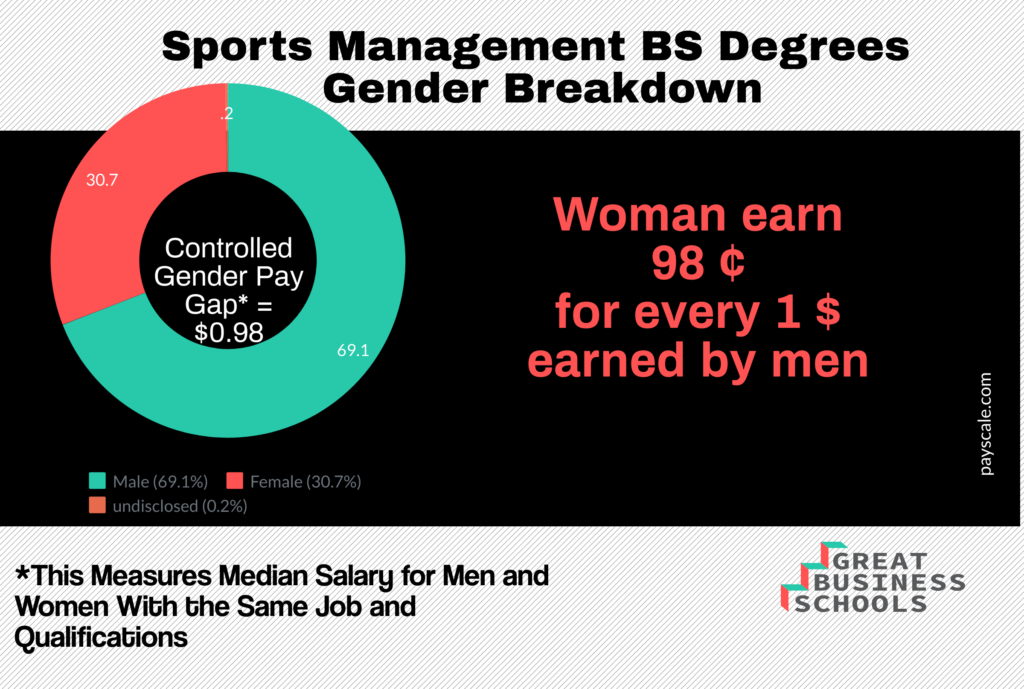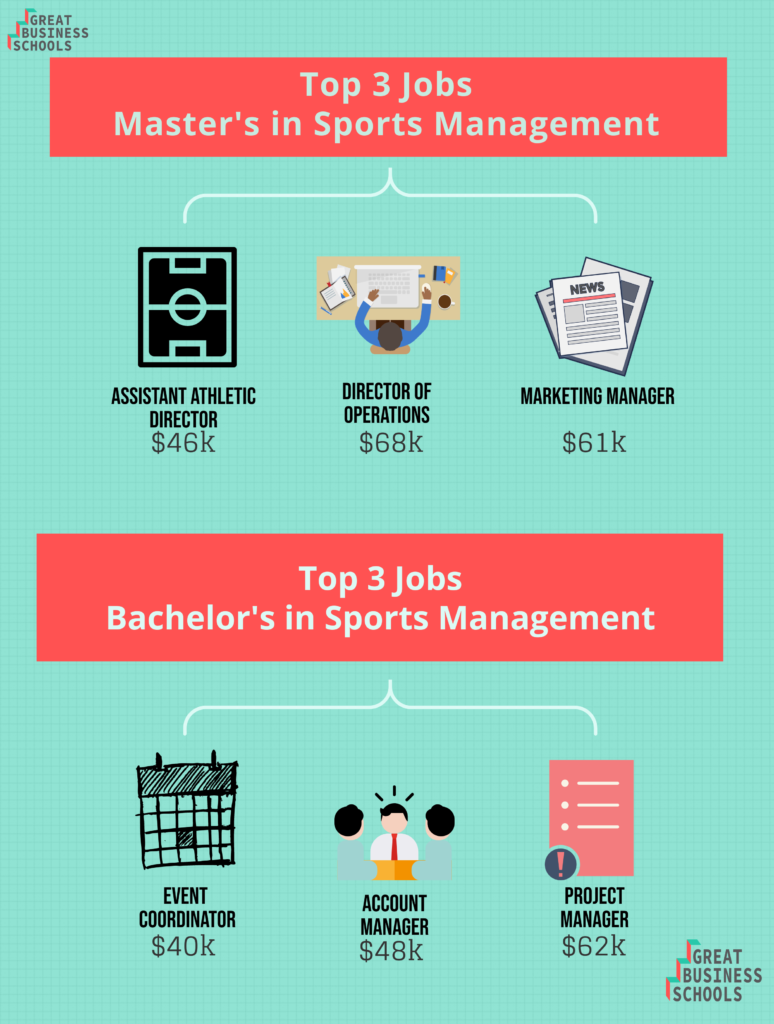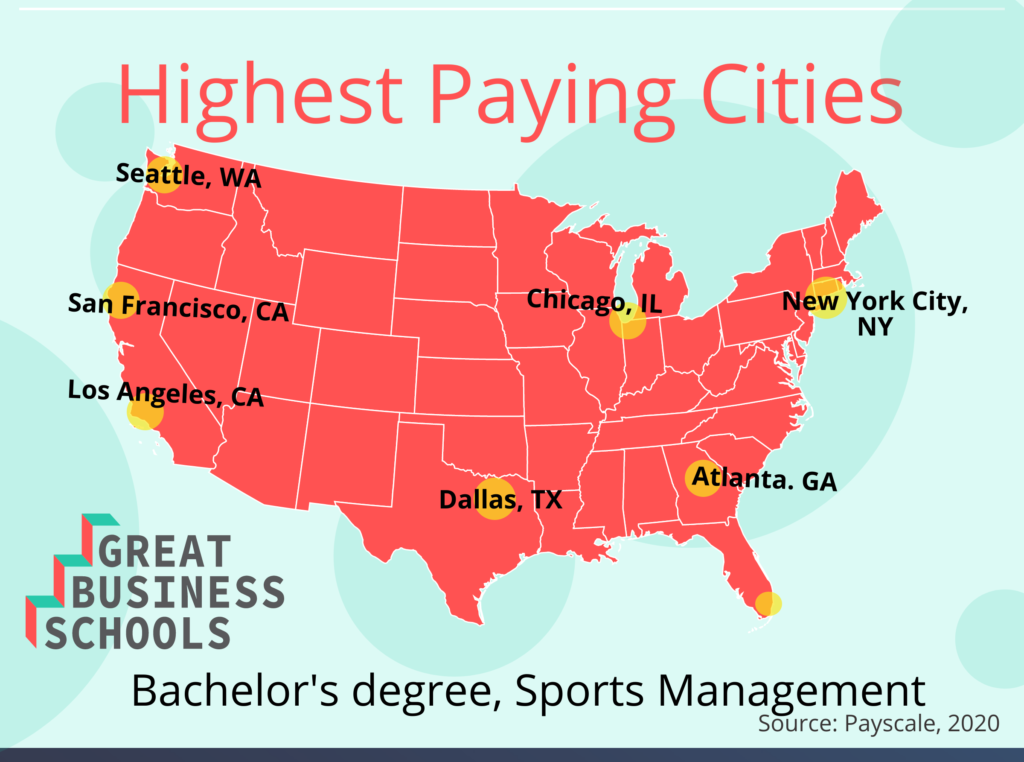The decision to pursue a career in the sports industry may require a bachelor’s degree in sports management or administration. By clarifying the roles available through sports administration, you can determine if a sports administration degree is a good choice for your plans.
The sports administration definition gives you a clear idea of the opportunities available for your career. The role of a sports administrator or a sports manager is to improve a program for sports. They may be involved in roles that focus on the profitability of a sports program or the benefits to the athletes in a program. The career may also emphasize the goal of creating a winning team of athletes for a sport.

Sports administration internships offer the opportunity to learn from experienced professionals and to gain experience in a specific field. You will want to evaluate the pros and cons of sports management based on your personal goals. Since each position within sports management and administration offers different benefits and downsides, you may discover that certain roles and positions are more ideal for your goals when compared to other options.
The key to evaluating a position for your career in sports management is clarifying your personal interests and the role you want to play in maintaining a team or setting up a new team. You may also want to consider roles working with schools and physical education programs. Since you have a variety of opportunities within sports management, a bachelor’s degree may offer the chance to start working with athletes and professionals within the sports industry.
Accreditation for Sports Management Programs
When you are looking into a sports management program, you want to evaluate the accreditation available for the school and the program. Each school and program has different advantages and disadvantages when it relates to your education and career goals. By clarifying the type of accreditation that applies to a program, you are able to ensure that you are qualified when you are working on your career.
Accreditation for any program falls into two primary categories: regional and national accreditation. Regional accreditation means that the program is accredited for a specific region or area of the country. For example, a program may be accredited for certain southern states or the eastern states. The program may not be recognized on a national level, so you will want to look for career opportunities within the appropriate region.
National accreditation applies to the entire country. COSMA accreditation is a type of national accreditation that you may see in many different colleges and universities. You may also notice that nationally recognized sports management programs are NASPE accredited. NASSM sport management programs are also a good choice when you are looking for a program that is recognized by an appropriate third party.
Sports management accreditation may also apply to specialized skills or areas of sports management. For example, if you are focusing on the financial aspects of sports management, then you may look for programs that offer specialized training in finance as it applies to the sports industry and the business of building up teams. The accreditation that may apply when you are considering a specialized area of sports management may vary, particularly if your college or university emphasizes double majors rather than a custom sports management program. For example, a school that recommends a minor in finance to gain specialized skills may need accreditation from an appropriate third-party that focuses on the financial courses rather than sports management.
Before you evaluate any program, you want to clarify the accreditation available to the school. Look for programs that are accredited on a regional or national level. You may also look for specialized accreditations or additional accreditation for minors or double-majors when you are looking into a program at the undergraduate level.

Types of Sports Management Degrees
If you are looking at a sports management degree, you may notice that you have more choices than you expect when looking into your options. A sports management major offers the basic education you need to work in your field; however, schools may also offer specialized training for specific types of careers within the sports industry.
The best colleges for sports management will often offer a specialized type of training at the undergraduate level. A bachelors in sports management may focus on general studies into sports management with a variety of courses to give an overview of the industry. The program may also offer specialized training through elective courses or through specialized training based on student decisions in relation to their majors.
In many cases, the best sports management colleges and universities will offer a variety of opportunities for student education. For example, you may be able to study sports management from the perspective of business administration. The emphasis in a program that focuses on business administration would be the business aspects of working in a sports management career. Alternatively, you may have specialized training in marketing or finance when looking into a career in sports management.
The top 10 sports management programs to fit your goals and plans will vary based on your interests. When you are looking for the top 10 sports management colleges, focus on programs that fit your specific career objectives. If your goal is to work as an agent and find talent for a team, then you will need training that emphasizes the process of narrowing down athletes for a team. On the other hand, if you want to improve the financial stability of a team or sports organization, then sports management degree colleges that offer a specialized degree in finance, accounting, or related topics will help with your goals.
Before you focus on finding the right sports administration degree for your career goals, you want to make a sports degrees list to ensure that you are looking into the right type of program. Sports management degree requirements may also vary based on the school or program, so make sure that you are able to meet the standards of the sports management degree schools that you are considering for your education.
You may also want to look into the opportunities within the school for accelerated education. An accelerated sports management program is a type of program that offers classes at a fast pace. Since the sports management degree classes are faster than average, you are able to finish your degree and start your career at a faster pace. Evaluate the sports administration major in the school to determine the type of program that fits your goals.
The final consideration when looking into the type of programs available is the format of your education. You can consider a sports management degree online to help you reach your goals without giving up on your flexibility. The advantage of online degrees in sports management is the flexibility to work around your schedule and your goals. An online sports management program allows you to work on course material at your own pace and when you have the time.
The downside of online sports management courses is that you need to maintain your focus and self-discipline throughout the program. Online sports management offers the same classes as a traditional program, but it gives you greater flexibility. You are still responsible to complete your course material by the set deadline for the class, so you must evaluate your goals when you are obtaining your education.
Keep in mind that online sports management programs may or may not be accredited. If you are looking at sports management courses online free of charge, then you may want to use caution. While some schools do offer free training programs or continuing education courses, you should be aware that online recreation management degree programs or similar programs are usually a type of online degree and you must make sure that it is an acceptable form of training for your career.
Sports management degree programs available online should still obtain appropriate accreditation by a third-party. You should also consider any specializations that are available for your degree. For example, you may find a sports analytics degree online that gives you specialized training. On the other hand, you may also find general courses or limitations to online programs through some schools. Keep in mind that each school or program offers variations in the online degrees they offer, so you may want to consider the details of the school when looking into a program.

Certifications or Licensing for Sports Management Careers
As a general rule, your role in sports management after you complete a degree or start your career will not require a license. Students are not expected to obtain a state or national license to work in the sports industry; however, you may need a sports management certificate when you are looking into a specific job. Licensing may be required if you decide to pursue a higher level of education and work as a lawyer or similar professional within the sports industry. Licensing standards may vary based on the type of career you decide to pursue and the level of education required for the career.
Sports management certification gives employers confidence in your specialized skills within the industry. It may focus on specific training or skill sets, or the certification may give employers confidence in your competence in a specific area of sports administration.
You can also obtain an online sports management certificate to get started in career while you are working on an undergraduate degree. Keep in mind that a certification is not the same as a degree. You may have limitations to your career if you do not pursue a higher level of education.
When you are looking at a certificate course in sports management, you want to make sure that the program is recognized by an appropriate third-party or accrediting organization. Avoid any programs that are not available through a reputable school, since it may not offer the training that you need.
Some career paths may require a specific certification to ensure that you are capable of handling the job. For example, you may need a specialized certification in sports analytics if you want to take on a job that relates to analyzing athletes, a sport, or the potential outcomes of a sporting event. Specialized certifications give you a clear path for your career and give employers confidence in your capabilities. The standards for certification may vary based on the team, organization, or employer, so you will want to evaluate the details of a job description to determine if a certification is a good choice for your situation.
Careers in Sports Management
A degree in sports management offers a variety of opportunities for your career. When you are still working on your degree, you want to clarify the sports administration jobs that fit your long-term goals and will help you start working in the area of sports that helps you gain the right contacts, connections, and skills to continue moving forward.
Sports management degree jobs vary significantly based on the responsibilities of a professional in an organization, sports team, or event. You can work as a manager for a sports team, a coach, a sports agent, a marketing professional, a financial professional, or a myriad of other career paths within the sports industry. When you are looking into your career options, look at the sports management job description to clarify your specific role and job responsibilities.
Sports management degree careers that focus on athletes are a popular choice for a job. You may want to work as a sports agent or a coach to interact with athletes and gauge their potential for a team. For individuals who are looking into a sports administration job description that is behind-the-scenes, you may focus on the business side of the activities.
What are some careers in sports management? It depends on your interests and your goals. You have a variety of opportunities that focus on business, marketing, and maintaining the financial stability of a sports team or sporting event. The opportunities may also apply to the legal side of the industry and contract negotiations. In some cases, you will work directly under a sports lawyer to ensure that contracts are legally binding and that all parties understand the terms of the contract. If you prefer to work with the athletes, then you can focus on working as a sports agent.
The roles and careers available in sports management are limited only by your personal interests and goals. Since sports are a large and growing industry, you can expect to find roles that fall into any area of interest beyond the basics of the actual sport or team. You can find career opportunities that range from working as an agent to working as an accountant within the sports industry.
Keep in mind that career opportunities are not limited to professional sports. Students can also find internships and job opportunities in schools, private organizations, and local businesses that focus on sports. The key is recognizing the potential for your career and then focusing on the areas that are most appropriate to help you reach your goals.
Sports Management Salary Potential
The salary potential for a career in sports management varies based on your role within an organization or on a team. You should keep in mind that the sports administration salary for any role may differ when you are looking at various locations due to the cost of living and the standards within a local area, so make sure you fully understand the details before you determine that the salary for a job is ideal for your goals.

When you are looking at sports management degree salary potential for the entire major, you may find that the range is broad and vague. The average salary within sports management is around $69,200 per year. The salary range for sports management careers is roughly $42,000 to $113,000 per year. Since professionals working in sports management may take on a variety of different roles, you will notice that the salary range differs for each job title.
A sports agent makes an average salary of roughly $51,700 per year. The salary range for the role is around $33,000 to $99,000 per year for most agents. When you decide to pursue the role of an agent, you may not make as much as a professional who pursues a role in the legal or financial sides of the business. You may also find that taking on more leadership roles may result in a higher income.
While the salary potential depends on the specific job and your responsibilities, you should keep in mind that your starting salary will usually be around the lower end of the salary range. You can expect to increase your income over time as you gain experience and develop specialized skills. You should also be aware that salary potential may vary based on your location. If you are in an urban area, then you may earn more when compared to a rural environment. The cost of living may impact your income potential and the benefits you are offered when looking into a career.
Every position within sports management may also impact your income potential. The salary range for sports management applies to the administrative, organizational, and selective roles within a sports team, organization, or group. It does not necessarily reflect specifics for a career or area of interest.
For example, if you decide to pursue a career that focuses on the legal aspects of sports, then you may find that you need a higher level of education and that your salary potential increases over time. A higher level of education may also impact your salary potential, so make sure you understand the differences that may apply within the industry. A Master’s in Sports Management or a Sports MBA can help make those advances.
Professional Organizations For Sports Management Careers
After you complete your education in sports management, you want to make sure that you join appropriate organizations and professional associations. Professional organizations offer a variety of benefits to your life and your career, so you want to make sure that you join one or a few organizations based on your goals.
Professional organizations allow you to network with individuals in your field. You are able to talk to professionals who have experience in the field and gain insight into different ways you can handle problems that may arise in your job. You are also able to find out about different job opportunities through an organization’s job board or through individuals in your network as you engage with others in the organization.
The professional organizations also help you keep up with continuing education credits and standards. Many organizations offer continuing education courses through the organization that you can use to keep up with the latest information and industry standards. It ensures that you are not facing undue challenges when you are looking for a career due to a lack of knowledge about new standards of professionalism within your area of sport management.
When you are looking for sports management associations and organizations, you want to consider the National Association for Sport and Physical Education. The association is a professional organization that works with sports administration and management professionals. It also accredits schools for their sports management programs, so you can feel confident that you are getting the right information when working with the organization.
If you are looking for more specialized organizations, then you may consider the American Marketing Association or the National Sporting Goods Association. The associations are designed around specific skills and areas of expertise within the sports industry.
You can also consider an international organization like the International Sports Management, Inc. The organization is designed around the specific challenges associated with working on an international scale or pursuing a career that works on organizing events that involve multiple countries. It is ideal when you are planning to work abroad or are looking for a career that works with different events, tournaments, or competitions that are designed around an international audience.
The key to finding the right organization to fit your goals for your career is to focus on your area of expertise and your plans for your career. You want to join organizations or associations that help you pursue your career objectives. Avoid organizations or associations that are not a good fit for your long-term plans.
Carrie Morris
Author
Warren Dahl
Editor-in-Chief

